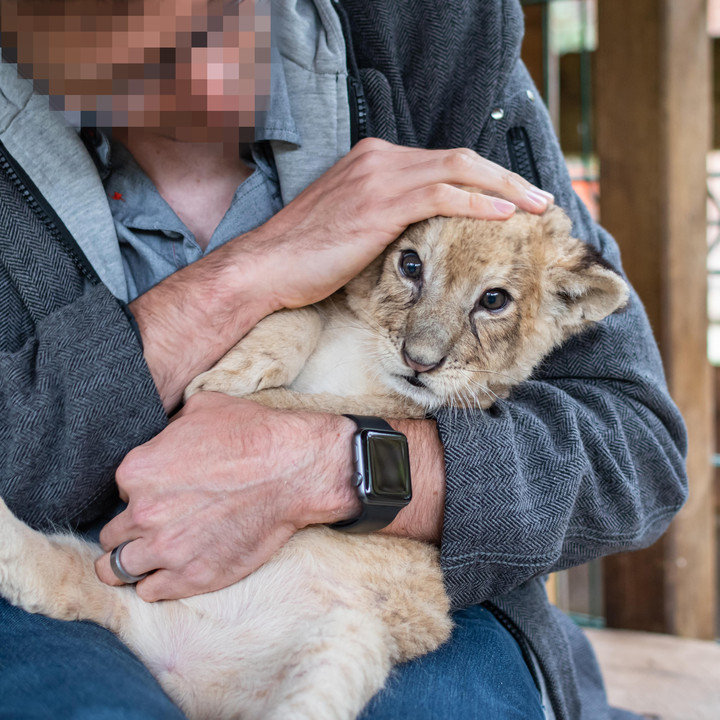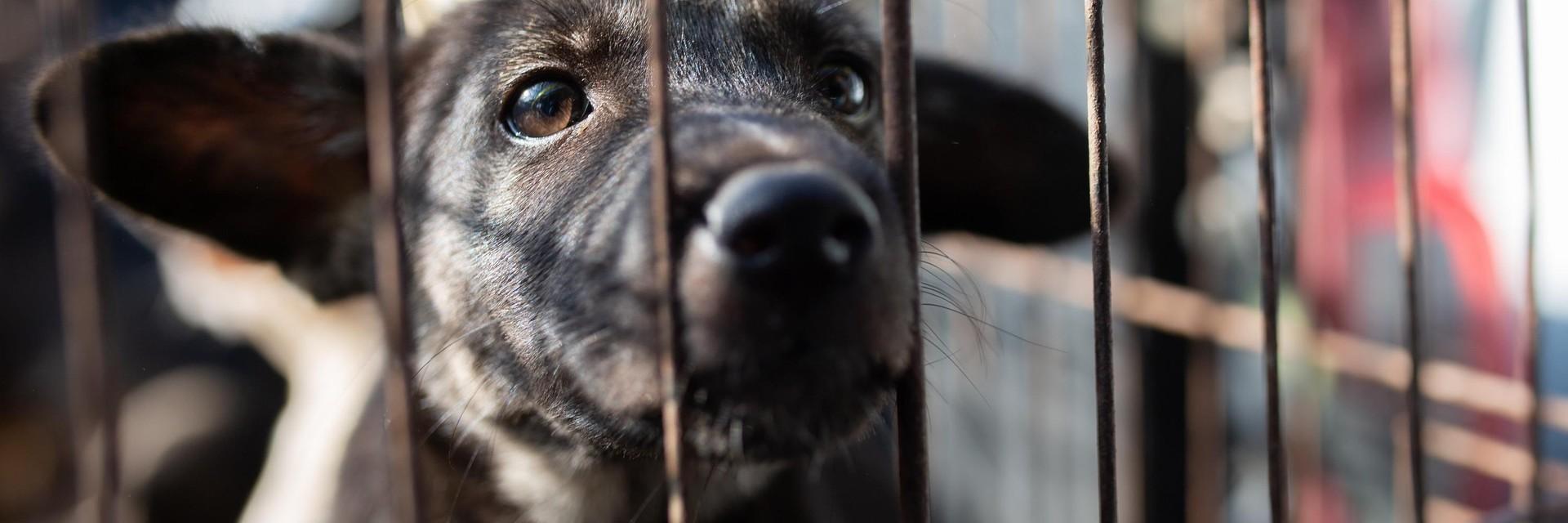Reporting Forms
Helping Wild Animals
Helping Pets
Helping Farm Animals
Reporting Forms

Report Puppy Traders
If you believe you may have acquired a puppy from an seller, or have observed suspicious puppy sales, then make a report here.

Report Dog and Cat Meat Trade
Use our reporting tool to tell us what you’ve seen.

Report Exploitation of Big Cats
Fill in the form to make a report.
Animal Cruelty
General information about what are the signs of animal cruelty and what to do if you witness it
What are the signs of cruelty to pets/animals?
Signs of cruelty can be physical, psychological and/or environmental.
For more information, see here.
I have witnessed an animal suffering. What should I do next?
Depending on the severity of the animal suffering, please contact the responsible veterinary office immediately (easy to find via Google, for example, enter 'veterinary office' and the corresponding postcode of the animal suffering case) or contact the local police.
Can I do something to prevent cruelty to animals?
We've put together recommendations on how to spot and prevent companion animal cruelty. See here.
Helping Wild Animals
How to handle an urgent situation with wild animals
There has been a car accident with a wild animal. What should I do?
Sadly, many thousands of animals are killed on the roads every year. There are ways to avoiding animal accidents but also knowing what to do in such a situation can save an animals life. See more here.
I have found a baby hare, alone and abandoned, what should I do?
Have you found a little brown hare, alone and abandoned on the roadside? In most cases, you do not need to worry. The mother is usually close by. However, to make sure you know what to do, find out more in our guide on finding young wild animals. Read more!
I have found a fawn (baby deer) or another wild animal alone in the cold season, what should I do?
If you have found a fawn or another young animal in the winter season, you should not immediately take it in. Find out what to do here.
A baby bird has fallen out of the nest, needs help, what should I do?
If you find a young bird all alone, then you should only intervene if you are sure it is a real emergency. This could be, for example, a newly hatched chick or very young bird.
A rescue is necessary if the bird is visibly injured or if you could see yourself that the parent bird has had an accident. If the animal is in an obviously dangerous place such as in the road, you should also intervene. Read more.
I have witnessed animal suffering to wild animals used for entertainment. What can I do?
If you witnessed direct animal cruelty to wild animals in circuses or other shows or attractions such as physical abuse or neglect, there are a number of steps you can take:
1. Secure evidence
2. Contact the local veterinary office
3. File an official complaint with the police
4. Talk to local animal welfare groups to get them on board
If you have witnessed any online exploitation of big cats, please report it using our form here.
I have found an injured wild animal, what should I do?
Firstly, it is very important to call a competent authority in case of a supposed wildlife emergency before you take action and take an animal yourself. Taking wild animals from their natural environment without good reason is prohibited, may be considered wildlife theft and may be punished accordingly!
Even if you find an obviously sick or injured wild animal, it is in your own interest to contact an expert, such as a wildlife centre in your area, to discuss how to proceed. Bear in mind that wild animals can bite hard, especially in stressful situations or when in pain! Also, you cannot estimate which diseases the animal might have.
If it has been agreed and thought best to transport the animal, being very careful, pick it up the animal and if you can you should immediately bring it to the nearest wild animal centre in a box (with air holes). Only an expert can take care of orphan breeding and release of young wild animals.
Helping Farm Animals
How to handle an urgent situation with farm animals
I have witnessed cruelty to farmed animals, what should I do?
If you have witnessed direct animal cruelty to a farm animal such as physical abuse or neglect, there are a number of steps you can take.
1. Secure evidence
2. Contact the local veterinary office
3. File an official complaint with the police
4. Talk to local animal welfare groups to get them on board
Find out more in detail on what to do here.
I've spotted a farm animal who needs immediate help due to injury or being stuck, what should I do?
If you have found a farm animal in immediate need of help due to being injured or stuck, you should firstly try to find the farmer/owner of the animal.
If you can, you should not hesitate to contact the responsible veterinary office immediately or, if life-threatening situations for the animals are concerned, call the nearest police station who can advise how to act.
Only ever intervene in a situation yourself if the situation is life threatening to the animal and where you are comfortable and that your safety is not compromised.
I have found a farm animal who is free-roaming, what should I do?
Adult animals: Don't try to approach a roaming farm animal, they may be frightened, insecure and stressed. There are many incidences where people are seriously hurt and even killed by approaching farm animals out of their home.
You should contact the owner if you know them as soon as possible, if you do not know the owner then you should contact the police who will be able to act quickly.
A free-roaming free farm animal can be very dangerous to people and pets. It is important that the animal is secured quickly.
Smaller animals such as chickens and ducks: it is likely that their home is close by, you should first try to locate the owner, and if you cannot, please contact the police.
For baby farm animals such as lambs: it is likely they have gotten through small holes in fencing. You should do the same as above, try to contact the owner first and if that is not possible then contact the police.
Pet Emergencies
How to handle an urgent situation with your dog, cat or other companion animal
My dog is lost/missing/ran away/stolen. What can I do?
We have put together a detailed guide for what to do if your dog has ran away, lost or been stolen. You can find out how to prevent dog theft here.
I am afraid my pet has been poisoned. What should I do?
You should always have the number of your vet at hand!
You should also keep the telephone numbers of a mobile veterinary practice and the next 24-hour animal clinic within easy reach.
Effects of poisoning can happen rapidly, and your pet can do downhill fast without urgent medical attention.
Emergency measures:
- Distance your dog from the poisoned bait
- Do not stimulate vomiting if you do not know what your dog has eaten (caustic poisons burn the throat; sharp objects cause injuries)
- Record what, how much and when something was eaten
- Call your vet, report your suspicion and describe the symptoms (this will give the vet the opportunity to prepare an antidote already)
- Get to the vet as fast as possible
- If possible, take a sample of the poisoned bait with you
Find out more here.
I suspect or know I am a victim of the puppy trade, what can I do?
If you suspect that the a puppy you have purchased or seen is traded illegally, please report the case to us here.
My cat has been involved in a car accident. What should I do?
Cats can often run across the street without being aware of the deadly danger of cars. If you see a cat that has been hit by a vehicle, there are a number of steps you should take. See here for more information.
There is a dog locked in a car in the sun and the dog is struggling, what should I do?
Firstly, you should try to find the dog's owner:
If you find a dog inside a car on a warm day, you should act immediately. First, try to find the owner. Try speaking to people close to the car to find out if they know who the car belongs to or by asking local shops/shopping centres to request them to ask for the owner over the speaker. If possible, mobilise a few people to help, at least one person should stay with the dog to monitor their condition.
Secondly, call the police:
If the dog is in danger of heatstroke, you should call the police. They are authorised to break the car window to save the dog. If the condition of the dog worsens before the police arrives and the owner cannot be located despite searching for them, breaking the car window is the only life saving option remaining.
Before breaking the window, do take pictures or videos showing the animal’s condition and have at least one other witness with you as property damage may apply.
Find out more about what to do here.
A disaster (flood, storm, hurricane, blizzard etc.) is about to strike, how can i protect my pet?
Disasters can strike in any place, at any time, and often there is little or no warning. See our detailed guide about pets in disaster preparedness.



